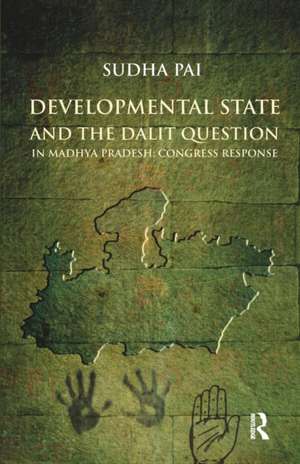Developmental State and the Dalit Question in Madhya Pradesh: Congress Response
Autor Sudha Paien Limba Engleză Paperback – 21 ian 2016
The present study puts to test the limits of the model of state-led development, of the use of political power by an enlightened political elite to introduce change from above to address the weaker sections of society. The working of the state is thus analysed in the context of the society in which it is embedded and the former’s ability to insulate itself from powerful vested interests. In interrogating this state-led redistributive paradigm, the study has generated empirical data based on extensive fieldwork and brought to the fore both the potentials and the limitations of using the model of ‘development from above’ in a democracy. It suggests that the absence of an upsurge from below limits the ability of an enlightened political elite that mans the developmental state to introduce social change and help the weaker sections of society.
| Toate formatele și edițiile | Preț | Express |
|---|---|---|
| Paperback (1) | 490.35 lei 43-57 zile | |
| Taylor & Francis – 21 ian 2016 | 490.35 lei 43-57 zile | |
| Hardback (1) | 1080.01 lei 43-57 zile | |
| Taylor & Francis – mar 2012 | 1080.01 lei 43-57 zile |
Preț: 490.35 lei
Nou
Puncte Express: 736
Preț estimativ în valută:
93.83€ • 98.21$ • 78.09£
93.83€ • 98.21$ • 78.09£
Carte tipărită la comandă
Livrare economică 31 martie-14 aprilie
Preluare comenzi: 021 569.72.76
Specificații
ISBN-13: 9781138664869
ISBN-10: 1138664863
Pagini: 554
Dimensiuni: 138 x 216 x 29 mm
Greutate: 0.64 kg
Ediția:1
Editura: Taylor & Francis
Colecția Routledge India
Locul publicării:Oxford, United Kingdom
ISBN-10: 1138664863
Pagini: 554
Dimensiuni: 138 x 216 x 29 mm
Greutate: 0.64 kg
Ediția:1
Editura: Taylor & Francis
Colecția Routledge India
Locul publicării:Oxford, United Kingdom
Public țintă
PostgraduateCuprins
List of Tables List of Abbreviations Preface and Acknowledgements Introduction: Developmental State, Dalit Question and Political Response Part I. The Congress Party: Dominance, Inclusion and the New Dalit Agenda 1. The Congress Party in MP: Origins and Early Patterns of Dominance 2. The Congress Party and the Politics of Social Inclusion: the 1980s and 1990s 3. Formulating a New Dalit Agenda: The Bhopal Document Part II. Land Reform for the Disadvantaged: An Experiment in Public Private Partnership 4. Formulating the Land Reform Agenda: A Background 5. Public Private Partnership in Land Reform: the Ekta Parishad and the Joint Task Force 6. Mapping Ground Reality: Implementation of the Land Distribution Programme in Selected Districts Part III. Moving Beyond Reservations: the Supplier Diversity Experiment 7. Moving Beyond Reservations: the Debate on Affirmative Action 8. New Initiatives in Affirmative Action: the Madhya Pradesh Experiment 9. Creating a Dalit Entrepreneurial Class: Selected Studies on Supplier Diversity Part IV. Political Fallout: Dalit Agenda and the 2003 Assembly Elections 10. Dalit Agenda, Land Distribution Policy and the 2003 Assembly Elections Appendix Glossary Index
Descriere
This book examines the Madhya Pradesh government’s attempt to win Dalit and tribal support by introducing change from above in a period of intense identity assertion, and suggests that limited success achieved through land distribution and supplier diversification was a fallout of the absence of an upsurge from below.




























